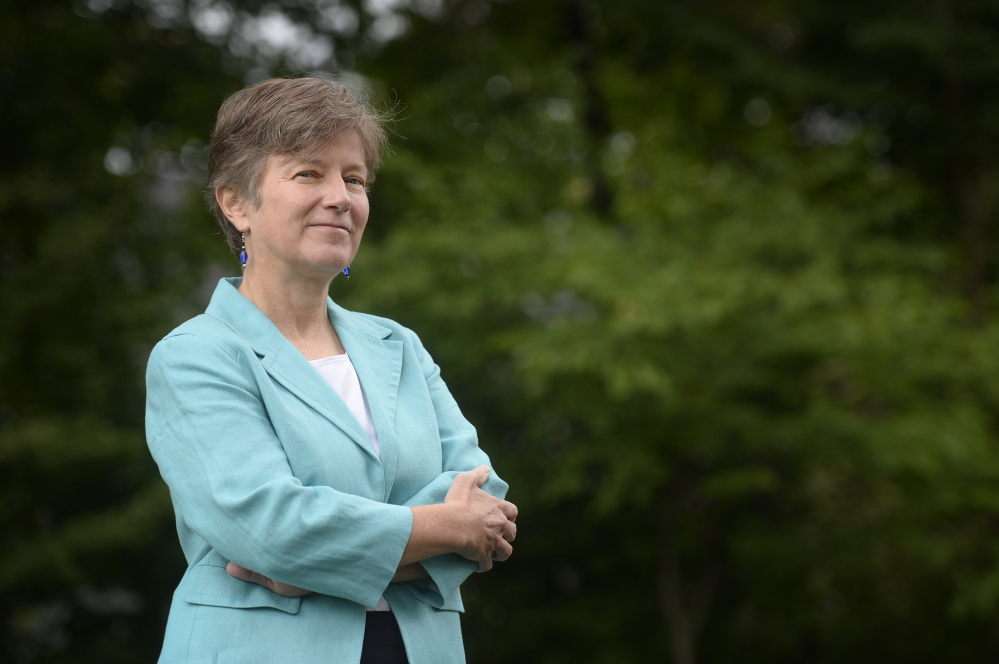The popular image of a hero is someone who jumps into action at just the right moment to save the day. But that definition is far too limiting, as the MacArthur Foundation showed this week when it announced that dogged Portland civil rights lawyer Mary Bonauto will receive a $625,000 grant for the success of her systematic long-term efforts to ensure legal recognition for the marriages of same-sex American couples.
Though Bonauto downplays her role in the same-sex marriage fight, she’s done as much as anyone to bring the movement as far as it has come. Twenty years ago, no state recognized a marriage between two men or two women. Ten years ago, just one state – Massachusetts – recognized same-sex marriages.
Today, same-sex marriage is legal in 19 states, including Maine. And Bonauto has been involved in every major state and federal legal battle along the way. So we hope she does savor her MacArthur Fellow status as evidence of how effective one person can be when she takes an incremental, strategic approach to achieving historic social change.
SEPARATE BUT NOT EQUAL
Bonauto had been working for the Boston legal group Gay and Lesbian Advocates and Defenders for six years when President Bill Clinton signed into law the 1996 Defense of Marriage Act, which defined lawful marriage as only between one man and one woman. Seen by the House Judiciary Committee as a vehicle to express “moral disapproval of homosexuality,” DOMA also denied recognition and a host of federal benefits and protections to married same-sex couples.
In response, Bonauto and two GLAD colleagues initiated a state-based strategy to secure government recognition of same-sex marriages. They started in Vermont, suing in 1997 on the grounds that the state’s same-sex civil marriage ban violated state constitutional guarantees of liberty and equality.
Though the 1999 ruling in the case led to the creation of civil unions for gay couples, it was a limited and inequitable victory that granted one group of citizens second-class legal protections based on the gender of the person with whom they wanted to share their life.
Civil unions are no substitute for marriage, Bonauto argued in GLAD’s next lawsuit, on behalf of seven gay and lesbian couples in Massachusetts. And when the supreme court there agreed, Massachusetts became the first state to allow same-sex marriage — a landmark 2003 decision that paved the way for 18 other states to follow, via legislation, court rulings or popular vote.
And as the legal precedents began accumulating and gay and lesbian couples rushed to marry, public opinion began to shift. A solid majority of Americans — 56 percent — now support same-sex marriage, according to a June Washington Post-ABC News poll, up from 38 percent in March 2004.
A BATTLE ON SEVERAL FRONTS
Bonauto has fought for marriage equality at the federal level as well: She led a GLAD team that challenged DOMA in U.S. District Court in Boston in 2009, thus providing a roadmap for the 2013 U.S. Supreme Court ruling that struck down DOMA as unconstitutional.
The state and federal same-sex marriage effort has been a battle fought on several fronts simultaneously, and it’s involved the government’s legislative, judicial and executive branches. (President Barack Obama announced in 2011 that his administration would no longer defend DOMA’s constitutionality.)
“I think about it as building blocks, and, brick by brick, building this structure of equality,” Bonauto said last year when she was interviewed for a New Yorker profile of the plaintiff in the Supreme Court DOMA case: Edith Windsor, now 85, who had to pay $363,000 in taxes because the federal estate tax exemption for surviving spouses didn’t apply to same-sex couples.
After Bonauto’s MacArthur grant was announced Wednesday, she pointed out that the United States still has a long way to go before marriage equality is in place nationwide. And she’s right. Thirty-one states still have bans on same-sex marriage, an issue that the Supreme Court is expected to take up in its coming term.
But we’ve also seen great strides toward freedom to marry in the United States, and Bonauto and others like her deserve recognition for leading the way.
Send questions/comments to the editors.



Comments are no longer available on this story